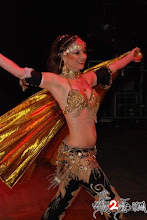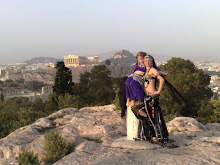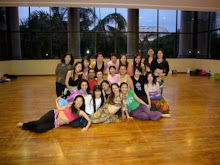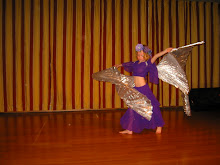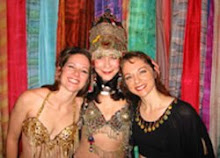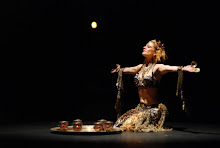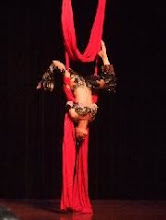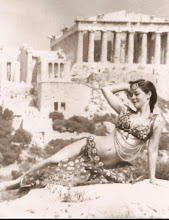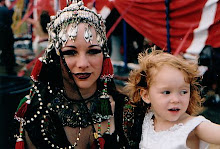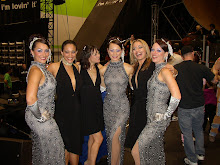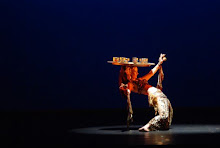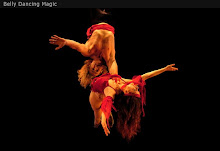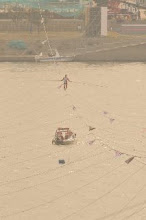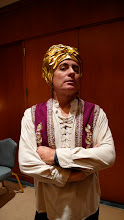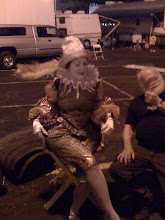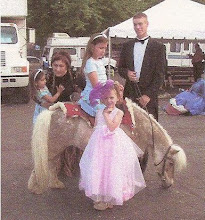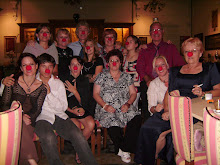My mother Rhea taught me – both explicitly and by example, that belly dance can be both a dance of empowerment and a full-time way of life.
My mom is quoted in a 1973 article on belly dance that appeared in the now defunct Venus magazine:
“When I dance, I don’t want to be seen as a sex object; I’m an artisan. I try to mesmerize, hypnotize the audience. I’m a sorceress, a magical trickster, the master of my body. I say to them: “Watch me do this over here, but did you see this move over here at the same time.” And I relate to the men and the women in the audience, and they relate to me. Belly dancing is not just a sensuous dance. Its an extravaganza, showing the feats of human capabilities.”
I love what she says here! And its true - Mom is an artisan, a magical trickster.
When a new student embarks on her belly dance journey, whether by choice or because their friend dragged them to their first class – it often becomes a profoundly transformative and integrative experience for body, mind and spirit.
Undulations, isolations, articulations, trembles, shimmies, flutters and rolls awaken the body and its deeply embedded ancient wisdoms.
Sometimes, for new students, the unfamiliar articulations of belly dance dredge up inarticulate anxieties of the soul – anxieties I see expressed on faces during class:
“My pelvis is tilting! My hips are hipping! My stomach is showing! My breasts are jiggling!”
But the remedy to these anxieties lies in the very movements that dredge them up. The anxieties are processed through practice, they are alchemized into a serenity and sureness that only sinuous training, passionate concentration and dedicated study of technique can bring.
In post-modern American Society, the ancient art of belly dance raises many important questions: Questions about gender, body image, ethnicity, emotion, art, entertainment, social roles and while we’re at it: the meaning of life. It is up to each student to live these questions for herself, but keep moving. As a teacher, I see belly dance as a tool of empowerment and joy. I believe belly dance moves energy through the body in healing ways and can change your life for the better.
When I have student recitals, I discourage the tense pursuit of perfection and encourage the enjoyment of process. Perfection is overrated. Process is where growth occurs, true and deep. We work hard in class on technique, but in performance we want to present ourselves with our natural grace and personality, incorporating more advanced technique as we grow as dancers. I like to pay homage to process and the journey, accepting ourselves as perfect just where we are along the way. We’re on this earth to have fun and dance, and we’ve found the secret to a joyful and empowered life: Belly dance.
Poetic Testimonial
“Women in Melina’s classes will embrace a new physicality that combats forces of depression and releases unadulterated joy!”
--Nassim Assefi, M.D.
ESSAY: Melina's Tray of Candles
From birth I was thrown into all aspects of belly dance – both the art and the business of it. I naturally accumulated skills because I had no choice: my mother knew the secret of making it impossible to say no. I was thrown into it like a newborn is thrown into a tub of water and finds it can swim to the surface.
Mom never prefaced anything by saying: “This is a hard thing to learn. If you practice every day, maybe you’ll master it enough to do it on stage.” Instead she said “Hey Melina, come in here and see if you can balance this tray of candles on your head.”
I’d trot over and presto – I found I could move around the kitchen with a large bronze tray on my head. “OK now see if you can do a backbend.” And I’d find I could. “Why don’t you try it on stage tonight, just for a second, and we’ll put a few lit candles on the top, and then just take it off and give it to me when you feel it slipping or you don’t want it anymore.” How can you say no to this?
That was mom’s secret:
“Just try it this once, and then I’ll never make you do it again.”
“Why not just try it and see how you like it?”
Three decades later, that tray has never fallen off my head.
Just when I thought I was beyond my mother’s wild idea clutches, it happened again. Just last summer while we were dancing together at Karoun’s.
I had the tray on my head, and mom suddenly left the stage, shimmied into the kitchen and came back out with three water glasses. There was no time to protest, I knew what was coming. She set the glasses up in the center of the stage and took my hand and led me to them.
“Stand up and balance on these glasses, dancing all the while with the tray on your head,” she was silently telling me in her "let's try this thing" Rhea language. Gripping her hand as I gingerly felt for the glasses with my bare feet, unable to look down lest the tray should fall and trusting only in my feet, my mother’s idea and will to succeed, and the intangible higher power of my belly dance goddess guide, I stepped up onto the glasses and danced: flames flickering up from the top of my head.
Melina’s Tips from the Hip:
Just try stuff and don’t be afraid.
Just try something for a second and then stop.
Don’t be afraid of what others think.
Practice “What if,” as in: “What if we did that, and we did it while singing/balancing on water glasses/drinking ouzo from a glass without hands, only teeth to hold the glass/….”
That is the Daughters of Rhea way.
Mom never prefaced anything by saying: “This is a hard thing to learn. If you practice every day, maybe you’ll master it enough to do it on stage.” Instead she said “Hey Melina, come in here and see if you can balance this tray of candles on your head.”
I’d trot over and presto – I found I could move around the kitchen with a large bronze tray on my head. “OK now see if you can do a backbend.” And I’d find I could. “Why don’t you try it on stage tonight, just for a second, and we’ll put a few lit candles on the top, and then just take it off and give it to me when you feel it slipping or you don’t want it anymore.” How can you say no to this?
That was mom’s secret:
“Just try it this once, and then I’ll never make you do it again.”
“Why not just try it and see how you like it?”
Three decades later, that tray has never fallen off my head.
Just when I thought I was beyond my mother’s wild idea clutches, it happened again. Just last summer while we were dancing together at Karoun’s.
I had the tray on my head, and mom suddenly left the stage, shimmied into the kitchen and came back out with three water glasses. There was no time to protest, I knew what was coming. She set the glasses up in the center of the stage and took my hand and led me to them.
“Stand up and balance on these glasses, dancing all the while with the tray on your head,” she was silently telling me in her "let's try this thing" Rhea language. Gripping her hand as I gingerly felt for the glasses with my bare feet, unable to look down lest the tray should fall and trusting only in my feet, my mother’s idea and will to succeed, and the intangible higher power of my belly dance goddess guide, I stepped up onto the glasses and danced: flames flickering up from the top of my head.
Melina’s Tips from the Hip:
Just try stuff and don’t be afraid.
Just try something for a second and then stop.
Don’t be afraid of what others think.
Practice “What if,” as in: “What if we did that, and we did it while singing/balancing on water glasses/drinking ouzo from a glass without hands, only teeth to hold the glass/….”
That is the Daughters of Rhea way.
PiperMethod YouTube Channel
Belly Dance Homework in between classes with your regular teacher!
Want to work on fine tuning your belly dance technique?
Visit my sister Piper's YouTube channel PiperMethod and hone in on the details of your dance technique.
Want to work on fine tuning your belly dance technique?
Visit my sister Piper's YouTube channel PiperMethod and hone in on the details of your dance technique.
Jareeda Magazine Interview with Melina by Morgana
Morgana's Interview with Melina of Daughters of Rhea
Published in Jareeda, December 2002
1) There's been a lot of debate in our culture about how divorce affects children; in your writing, you express that although you felt a lot of heart ache, you feel blessed that you had such an adventurous childhood, traveling around and experiencing so many different cultures.
My parents separated before I was out of diapers. To this day I can’t imagine them as a couple and never wished they were. Like most children, I was resilient and accepting of the way things were. I benefited greatly from their personal and professional life choices, their unconditional love and their commitment to involving me in all aspects of their lives. Because of them I was exposed from birth to a vibrant and diverse slew of countries, cultural settings, ways of life, and artistic and intellectual milieux. I was equally comfortable in Greek tavernas, communes in Berkeley, circus tents, Aegean islands, New York subways, bohemian intellectual gatherings, folk music jams and feminist belly dance circles. By the age of 10 I knew how to perform for live audiences, turn cartwheels in a circus ring, belly dance with a tray of lit candles on my head before hundreds of tourists, converse with adults, and change planes by myself in Amsterdam. In the midst of all the changes and transitions, I would plant myself in the pages of a book to find my center - books were where I anchored myself. But the ultimate truth is that I am lucky to have such humorous, creative & spiritual people for my mother and father.
2) Since you also had a rich experience as a circus performer, do you feel that has influenced you as a Middle Eastern artist and vice versa? Do you feel that performers benefit by "cross-training" this way in different disciplines?
No matter what the theatre, an audience can feel it when you are expressing your fullest, most confident and expansive self. The more tools and skills you can summon for a performance, the better. Of course, context plays an important role, as you want to tailor the way you perform to fit the setting. As a circus performer you have to play to an audience of up to 1600 people. You have to project your energy, your skill and your joy beyond the ringside VIPs all the way up to the kid sitting with her popcorn in the highest bleacher. You need to rivet their gaze from the moment you step into the ring, and so you learn to take your time, be larger than life, dramatic and unrestrained. You also have to be completely spontaneous and ready for anything as there is a lot going on in the circus ring that you have no control over. You have to be ready to reinvent the “script” if someone messes up a trick, or if the clown you are dancing with misses his cue, or if the elephant pees in the ring, or if your juggling act falls apart because people keep dropping clubs. You must dance on, dance on, and dance on... The audience needs to see that everything is all right, that you are OK and in charge.
I also learned a lot about costuming, make-up and self-presentation from watching the Flying Wallenda family both on the high wire and behind the scenes. Their example inspired my home-sewn belly dance costumes to get more sparkly and theatrical, my make-up more exaggerated, and my stage presence more dramatic. I also learned to use my voice and cymbals to maximum effect in the ring. The circus teaches you to use whatever means are at your disposal to create transformative energy and to draw the audience’s eye to the show. The circus is also a great place to combine skills, which for me has resulted in interesting new dance ideas. I sometimes like to integrate juggling, acrobatics, tambourines, & balancing into my regular belly dance performances and troupe choreographies. Yes, performers of all kinds benefit from “cross-training”.
3) Living and performing in Greece as you and your mom and Piper have, how does actually living and working in an eastern culture affect what you bring to the stage as a dancer?
No matter what corner of the globe they hail from, human beings respond well to dancers who project professionalism, confidence, their authentic selves & good dance technique. Growing up in Greece and understanding Greeks and how they interact means that I do know what Greeks like, however, and has helped me connect with and please Greek audiences.
4) You describe education such as your PhD in French medieval literature "as a stabilizing influence" in your life. Please explain more about that.
No matter how many changes and displacements I experienced as a kid, I could always depend on books and on the structure of academic life to bring a comforting and predictable rhythm to my otherwise itinerant life. As a nomadic child, books were my anchors, narrative constants as I chartered back and forth between the wildly disparate worlds of my mother and father. My natural love of learning, of books, of foreign languages, of literary history and criticism, and of writing led me to pursue a PhD in French Literature. The Ivory Tower has always been a refuge when I needed it, but I wouldn’t want to be stuck there forever: I also like to descend the tower and shimmy.
5) Please also tell about your desire to study French medieval literature, and if you think the sentiments of that literature have had their own impact on you as a performer.
I think it would take a book to fully explore my response to this question! From early childhood I immersed myself in literature, from the mythic poems of Homer to the weird and magical worlds of Madeleine L’Engle, Raoul Dahl and Frank L. Baum. I also liked stories of how words and a discovery of writing could change lives from the inside out. As a literature major at Wellesley College I wanted to explore the power of words and the various transformative modes of female self-expression. I wrote my undergraduate honor’s thesis on Marguerite Duras and the intertwined themes of female subjectivity, self-expression and writing. Later in graduate school at UPenn I wrote my doctoral dissertation on the interplay of old age, female authority and the representation of the female body in late medieval French literature. Being a scholar and writer has only enriched my life as a dancer and performer. I am very attuned to the ways society constructs and limits human beings by gender and age stereotyping and I enjoy resisting convention and (artfully!) innovating as much as possible with belly dance. I am always conscious of the story I am telling with my dance, and I like my performance to transform or energize the viewer in some way. Bottom line is I want the audience to go home feeling inspired and positive.
6) Some people do seem surprised when they learn that an Oriental dancer has an advanced degree of study, despite the fact that there are doctors, professors, anthropologists, journalists and all sorts of professionals doing Oriental dance. Do you think there is pressure for dancers on the professional dance track to downplay their intelligence or education?
I hope not. No one should ever have to deny the full spectrum of their experience to serve the needs of narrow-minded people and their misguided notions about Oriental dancers.
6) Coming from a family of dancers, how does one balance the fact that dance runs in the family with creating ones' own identity as a dancer?
I never consciously created my own ‘dance identity’, it just came about naturally. In our family it was the norm to dance for fun and profit. Piper and I grew up in the Land of Belly Dance Art & Biz, and we navigated that land easily from a young age. Mom encouraged our maximal self-expression as dancers and celebrated our strengths and differences. In both life and dance Mom, Piper and I have learned from each other in immeasurable ways – we are stronger as individuals and as dancers because we have each other.
7) Now that you're a mom, to Zoë, how (if at all) has that affected your feelings about your own mom, and everything that goes with being a mom? Do you see some of your upbringing with a different perspective now?
I appreciate my upbringing and my mother’s choices even more now that I am a mom. My childhood was so enriching and wild! I was given such incredible gifts – a love of dance, bravery, the knowledge that if a door closes a window opens somewhere else, an open mind and heart – this is the legacy I want to pass on to Zoë.
8) Even though she's still a toddler, Zoë seems quite comfortable already in the atmosphere of Middle Eastern music and dance. Is it your hope that she will follow in your and your mom's and sister's footsteps?
Yes, dance is already an integrated part of Zoë’s life, as natural a function as breathing. Every morning she heads to the dance room of her own accord for a little free style twirling. Her father makes her little costumes and we cart her around to my early-night gigs and belly dance festivals. But like my mom did with me, I will never force the dance on Zoë. It will however always be there for her if she wants it.
What if she decides when she's older that this is not for her and chooses a different path?
Zoë Isadora is free to choose her own path in life. Zoë means life in Greek, and life is unpredictable, wild, exciting, fulfilling and in the best case filled with love. Her middle name, Isadora, is from the dancer Isadora Duncan, a brave and independent free spirit and innovator who reminds me of my mother. I have a feeling that no matter what path she chooses Zoë will be original and determined, because this is the DNA that runs in her blood! So Zoë could be a librarian, the president, a CEO, an engineer, a writer, a dancer, a therapist, a slacker. Who knows. I had no restrictions put on me growing up in terms of future professions or life paths. I was given opportunities, my intuitions were honored, and my natural inclinations were nurtured. And this is all I wish for Zoë: a sense of many possibilities, a cushion of unconditional love, many avenues of self-expression to choose from, confidence in herself, an attitude of kindness and humanity towards others, and an ability to access and honor her inner voice.
9) Some people, even people who've had adventurous lives, say they feel a lot more conservative once kids come along -- or that they wouldn't feel comfortable if their children took the same risks they did. When you think about the adventurous life that you have and have had, does that have an effect on your feelings as a mom?
I am not more conservative now that I’m a mother. In fact I’m probably less conventional now than ever before. But I have always been a responsible soul. Its not like my adventurous upbringing was full of life-threatening risk or anything, it was just artistic and weird, and I still like things that are artistic and weird. I can’t say exactly how I’ll feel every step of the way as a mother to Zoë, but I do believe that she is her own person and will be taking responsibility for her own life choices.
Are there any final thoughts you'd like to share about dance, about motherhood, daughterhood and sisterhood, and about your rich and full life? Any thoughts you'd like to pass on to other dancers in pursuit of their dreams?
Besides saying that my daughter, my sister and my mother rock! And that for me some of the keys to life and dance are thinking through your choices, maintaining a sense of humor in the face of disagreement, taking risks, flouting convention, and never putting others down, I would like to share excerpts from my Daughters of Rhea mission statement. I see Oriental Dance as one way to reach toward and perpetuate the beauty of the world. My goal is to encourage women’s unique expression of their wild, most ecstatic selves through the ancient art of belly dance. With this dance I want to celebrate life, creativity and community. I want us to be in our bodies with pride, awareness and open hearts. I want us to couple technique and precision with enthusiasm and passion, to be industrious in practice so we can be Dionysian in performance, and to be open to transformation and revelation at every stage of our dance career. I also want to say this: My 33-year old brother-in-law has Lou Gehrig’s disease and is confined to a wheelchair. His prognosis is not good. He can no longer dance, and so I dance for him. I use this dance to raise money for a cure and to spread awareness about the disease. I exhort everyone to dance because you can, to dance because your body wants to dance, to dance because life is short and it is one of the best ways to spend your time. And stop worrying about what everyone else thinks. Dance your dreams no matter what.
Published in Jareeda, December 2002
1) There's been a lot of debate in our culture about how divorce affects children; in your writing, you express that although you felt a lot of heart ache, you feel blessed that you had such an adventurous childhood, traveling around and experiencing so many different cultures.
My parents separated before I was out of diapers. To this day I can’t imagine them as a couple and never wished they were. Like most children, I was resilient and accepting of the way things were. I benefited greatly from their personal and professional life choices, their unconditional love and their commitment to involving me in all aspects of their lives. Because of them I was exposed from birth to a vibrant and diverse slew of countries, cultural settings, ways of life, and artistic and intellectual milieux. I was equally comfortable in Greek tavernas, communes in Berkeley, circus tents, Aegean islands, New York subways, bohemian intellectual gatherings, folk music jams and feminist belly dance circles. By the age of 10 I knew how to perform for live audiences, turn cartwheels in a circus ring, belly dance with a tray of lit candles on my head before hundreds of tourists, converse with adults, and change planes by myself in Amsterdam. In the midst of all the changes and transitions, I would plant myself in the pages of a book to find my center - books were where I anchored myself. But the ultimate truth is that I am lucky to have such humorous, creative & spiritual people for my mother and father.
2) Since you also had a rich experience as a circus performer, do you feel that has influenced you as a Middle Eastern artist and vice versa? Do you feel that performers benefit by "cross-training" this way in different disciplines?
No matter what the theatre, an audience can feel it when you are expressing your fullest, most confident and expansive self. The more tools and skills you can summon for a performance, the better. Of course, context plays an important role, as you want to tailor the way you perform to fit the setting. As a circus performer you have to play to an audience of up to 1600 people. You have to project your energy, your skill and your joy beyond the ringside VIPs all the way up to the kid sitting with her popcorn in the highest bleacher. You need to rivet their gaze from the moment you step into the ring, and so you learn to take your time, be larger than life, dramatic and unrestrained. You also have to be completely spontaneous and ready for anything as there is a lot going on in the circus ring that you have no control over. You have to be ready to reinvent the “script” if someone messes up a trick, or if the clown you are dancing with misses his cue, or if the elephant pees in the ring, or if your juggling act falls apart because people keep dropping clubs. You must dance on, dance on, and dance on... The audience needs to see that everything is all right, that you are OK and in charge.
I also learned a lot about costuming, make-up and self-presentation from watching the Flying Wallenda family both on the high wire and behind the scenes. Their example inspired my home-sewn belly dance costumes to get more sparkly and theatrical, my make-up more exaggerated, and my stage presence more dramatic. I also learned to use my voice and cymbals to maximum effect in the ring. The circus teaches you to use whatever means are at your disposal to create transformative energy and to draw the audience’s eye to the show. The circus is also a great place to combine skills, which for me has resulted in interesting new dance ideas. I sometimes like to integrate juggling, acrobatics, tambourines, & balancing into my regular belly dance performances and troupe choreographies. Yes, performers of all kinds benefit from “cross-training”.
3) Living and performing in Greece as you and your mom and Piper have, how does actually living and working in an eastern culture affect what you bring to the stage as a dancer?
No matter what corner of the globe they hail from, human beings respond well to dancers who project professionalism, confidence, their authentic selves & good dance technique. Growing up in Greece and understanding Greeks and how they interact means that I do know what Greeks like, however, and has helped me connect with and please Greek audiences.
4) You describe education such as your PhD in French medieval literature "as a stabilizing influence" in your life. Please explain more about that.
No matter how many changes and displacements I experienced as a kid, I could always depend on books and on the structure of academic life to bring a comforting and predictable rhythm to my otherwise itinerant life. As a nomadic child, books were my anchors, narrative constants as I chartered back and forth between the wildly disparate worlds of my mother and father. My natural love of learning, of books, of foreign languages, of literary history and criticism, and of writing led me to pursue a PhD in French Literature. The Ivory Tower has always been a refuge when I needed it, but I wouldn’t want to be stuck there forever: I also like to descend the tower and shimmy.
5) Please also tell about your desire to study French medieval literature, and if you think the sentiments of that literature have had their own impact on you as a performer.
I think it would take a book to fully explore my response to this question! From early childhood I immersed myself in literature, from the mythic poems of Homer to the weird and magical worlds of Madeleine L’Engle, Raoul Dahl and Frank L. Baum. I also liked stories of how words and a discovery of writing could change lives from the inside out. As a literature major at Wellesley College I wanted to explore the power of words and the various transformative modes of female self-expression. I wrote my undergraduate honor’s thesis on Marguerite Duras and the intertwined themes of female subjectivity, self-expression and writing. Later in graduate school at UPenn I wrote my doctoral dissertation on the interplay of old age, female authority and the representation of the female body in late medieval French literature. Being a scholar and writer has only enriched my life as a dancer and performer. I am very attuned to the ways society constructs and limits human beings by gender and age stereotyping and I enjoy resisting convention and (artfully!) innovating as much as possible with belly dance. I am always conscious of the story I am telling with my dance, and I like my performance to transform or energize the viewer in some way. Bottom line is I want the audience to go home feeling inspired and positive.
6) Some people do seem surprised when they learn that an Oriental dancer has an advanced degree of study, despite the fact that there are doctors, professors, anthropologists, journalists and all sorts of professionals doing Oriental dance. Do you think there is pressure for dancers on the professional dance track to downplay their intelligence or education?
I hope not. No one should ever have to deny the full spectrum of their experience to serve the needs of narrow-minded people and their misguided notions about Oriental dancers.
6) Coming from a family of dancers, how does one balance the fact that dance runs in the family with creating ones' own identity as a dancer?
I never consciously created my own ‘dance identity’, it just came about naturally. In our family it was the norm to dance for fun and profit. Piper and I grew up in the Land of Belly Dance Art & Biz, and we navigated that land easily from a young age. Mom encouraged our maximal self-expression as dancers and celebrated our strengths and differences. In both life and dance Mom, Piper and I have learned from each other in immeasurable ways – we are stronger as individuals and as dancers because we have each other.
7) Now that you're a mom, to Zoë, how (if at all) has that affected your feelings about your own mom, and everything that goes with being a mom? Do you see some of your upbringing with a different perspective now?
I appreciate my upbringing and my mother’s choices even more now that I am a mom. My childhood was so enriching and wild! I was given such incredible gifts – a love of dance, bravery, the knowledge that if a door closes a window opens somewhere else, an open mind and heart – this is the legacy I want to pass on to Zoë.
8) Even though she's still a toddler, Zoë seems quite comfortable already in the atmosphere of Middle Eastern music and dance. Is it your hope that she will follow in your and your mom's and sister's footsteps?
Yes, dance is already an integrated part of Zoë’s life, as natural a function as breathing. Every morning she heads to the dance room of her own accord for a little free style twirling. Her father makes her little costumes and we cart her around to my early-night gigs and belly dance festivals. But like my mom did with me, I will never force the dance on Zoë. It will however always be there for her if she wants it.
What if she decides when she's older that this is not for her and chooses a different path?
Zoë Isadora is free to choose her own path in life. Zoë means life in Greek, and life is unpredictable, wild, exciting, fulfilling and in the best case filled with love. Her middle name, Isadora, is from the dancer Isadora Duncan, a brave and independent free spirit and innovator who reminds me of my mother. I have a feeling that no matter what path she chooses Zoë will be original and determined, because this is the DNA that runs in her blood! So Zoë could be a librarian, the president, a CEO, an engineer, a writer, a dancer, a therapist, a slacker. Who knows. I had no restrictions put on me growing up in terms of future professions or life paths. I was given opportunities, my intuitions were honored, and my natural inclinations were nurtured. And this is all I wish for Zoë: a sense of many possibilities, a cushion of unconditional love, many avenues of self-expression to choose from, confidence in herself, an attitude of kindness and humanity towards others, and an ability to access and honor her inner voice.
9) Some people, even people who've had adventurous lives, say they feel a lot more conservative once kids come along -- or that they wouldn't feel comfortable if their children took the same risks they did. When you think about the adventurous life that you have and have had, does that have an effect on your feelings as a mom?
I am not more conservative now that I’m a mother. In fact I’m probably less conventional now than ever before. But I have always been a responsible soul. Its not like my adventurous upbringing was full of life-threatening risk or anything, it was just artistic and weird, and I still like things that are artistic and weird. I can’t say exactly how I’ll feel every step of the way as a mother to Zoë, but I do believe that she is her own person and will be taking responsibility for her own life choices.
Are there any final thoughts you'd like to share about dance, about motherhood, daughterhood and sisterhood, and about your rich and full life? Any thoughts you'd like to pass on to other dancers in pursuit of their dreams?
Besides saying that my daughter, my sister and my mother rock! And that for me some of the keys to life and dance are thinking through your choices, maintaining a sense of humor in the face of disagreement, taking risks, flouting convention, and never putting others down, I would like to share excerpts from my Daughters of Rhea mission statement. I see Oriental Dance as one way to reach toward and perpetuate the beauty of the world. My goal is to encourage women’s unique expression of their wild, most ecstatic selves through the ancient art of belly dance. With this dance I want to celebrate life, creativity and community. I want us to be in our bodies with pride, awareness and open hearts. I want us to couple technique and precision with enthusiasm and passion, to be industrious in practice so we can be Dionysian in performance, and to be open to transformation and revelation at every stage of our dance career. I also want to say this: My 33-year old brother-in-law has Lou Gehrig’s disease and is confined to a wheelchair. His prognosis is not good. He can no longer dance, and so I dance for him. I use this dance to raise money for a cure and to spread awareness about the disease. I exhort everyone to dance because you can, to dance because your body wants to dance, to dance because life is short and it is one of the best ways to spend your time. And stop worrying about what everyone else thinks. Dance your dreams no matter what.
Subscribe to:
Comments (Atom)
